Quote from TS Eliot seals outcome of Brexit negotiations, December 2020
 The President of the European Commission, Ursula von der Leyen, quoted lines from TS Eliot’s Little Gidding in her remarks on reaching a Brexit agreement with the UK government.
The President of the European Commission, Ursula von der Leyen, quoted lines from TS Eliot’s Little Gidding in her remarks on reaching a Brexit agreement with the UK government.
Her speech on 24th December contained the following:
“Ladies and Gentlemen,
“At the end of successful negotiations I normally feel joy.
“But today I only feel quiet satisfaction and, frankly speaking, relief.
“I know this is a difficult day for some.
“And to our friends in the United Kingdom I want to say: parting is such sweet sorrow.
“But to use a line from TS Eliot: What we call the beginning is often the end. And to make an end is to make a beginning.”
In The Observer, Kenan Malik considered the significance of the quotation, and how “Rereading Four Quartets is a fitting epitaph for 2020 and no better way of reflecting on the year to come.”
———————————————————————————————————-
Performances of Britten’s settings of TS Eliot’s poems, December 2020
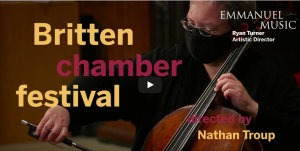 An online streamed recording from the three-part Britten Chamber Festival mounted by Boston’s Emmanuel Music includes two of Benjamin Britten’s settings of poems by TS Eliot – and incorporates text subtitles from the works.
An online streamed recording from the three-part Britten Chamber Festival mounted by Boston’s Emmanuel Music includes two of Benjamin Britten’s settings of poems by TS Eliot – and incorporates text subtitles from the works.
At 34:40 in the recording is Britten’s setting of The Death of Saint Narcissus, the unpublished poem which Eliot drew upon for The Waste Land. Britten’s Canticle V, Op 89, it was written in 1974 while Britten was recuperating from a heart operation. His wide reading at this time included poetry by T S Eliot, whom he admired ‘for the clarity and security of his language’.
The recording also includes, at 1:00:10, Britten’s setting of Eliot’s Journey of The Magi, his Canticle IV, Op. 86 (1971). The recording is available here for sixty days.
———————————————————————————————————-
Eliot’s 1918 Irish review, December 2020
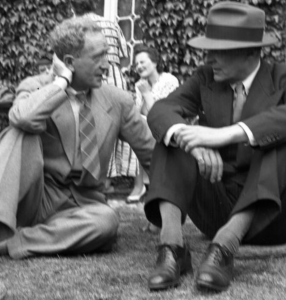 In an article in The Irish Times, Karl O’Hanlon writes about Desmond FitzGerald, an Easter 1916 rebel, Free State government minister and father of future taoiseach Garret FitzGerald, who was responsible for what now appears to be the first Irish review of Eliot’s poetry.
In an article in The Irish Times, Karl O’Hanlon writes about Desmond FitzGerald, an Easter 1916 rebel, Free State government minister and father of future taoiseach Garret FitzGerald, who was responsible for what now appears to be the first Irish review of Eliot’s poetry.
FitzGerald’s enthusiastic May 1918 review of The Love Song of J Alfred Prufrock was published in the nationalist review Ar n-Éire/New Ireland. “It is a remarkable document,” writes O’Hanlon, “Eliot’s poetic tour de force finding hospitality in a Sinn Féin journal where it did not in the Times Literary Supplement and other newspapers of record.”
The two men later became friendly, and the article also includes some rare photographs from the FitzGerald family collection of Eliot with FitzGerald and others.
———————————————————————————————————-
Edna O’Brien delivers Abbey Theatre TS Eliot Lecture, December 2020
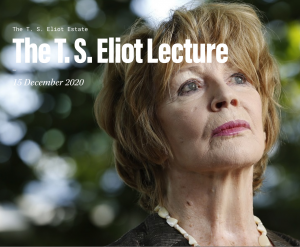 Normally given each year in Dublin, this year’s Abbey Theatre TS Eliot Lecture is being delivered online by the writer Edna O’Brien. Recorded at the Irish Embassy in London, the lecture, on Eliot’s life and work, is being broadcast on 15th December, her 90th birthday.
Normally given each year in Dublin, this year’s Abbey Theatre TS Eliot Lecture is being delivered online by the writer Edna O’Brien. Recorded at the Irish Embassy in London, the lecture, on Eliot’s life and work, is being broadcast on 15th December, her 90th birthday.
“I wanted to give a sense of the poetry, the person, the mystic and the sometimes quite cruel man,” she told The Guardian, “without making it into a gossip piece.”
The lecture is preceded by a reading of Eliot’s Rhapsody on a Windy Night by Sinéad Cusack, and followed by an interview with O’Brien. It is available online until 15th January.
———————————————————————————————————-
Postponed – the 2021 International TS Eliot Summer School, December 2020
 The International TS Eliot Summer School has been postponed for a further year.
The International TS Eliot Summer School has been postponed for a further year.
Held annually in London, the 2020 Summer School had to be postponed because of the pandemic, and now the 2021 Summer School has been forced to follow suit. “It’s a damnable shame,” said Professor Anthony Cuda, Director, “but one simply can’t plan amidst such uncertainty.”
There will instead be a variety of digital events (both live and prerecorded) hosted by the Summer School and to be made available in the coming months and over the summer. (The School has already posted several Digital Sessions by some of its tutors.) If the conditions permit, they may also host occasional in-person events over the summer in London.
And they are already looking ahead to a grand reunion in 2022. “We’re confident,” says Professor Cuda, “that we can keep the momentum going.”
———————————————————————————————————-
Eliot’s relationship with Emily Hale, again, December 2020
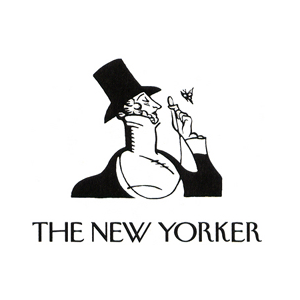 An article in the New Yorker magazine, The Secret History of T. S. Eliot’s Muse, presents a now familiar view of Eliot’s relationship with Emily Hale as revealed by his letters to her.
An article in the New Yorker magazine, The Secret History of T. S. Eliot’s Muse, presents a now familiar view of Eliot’s relationship with Emily Hale as revealed by his letters to her.
Michelle Taylor, a doctoral candidate in English at Harvard, traces the popular narrative of their relationship, employing mostly previously-published quotes from the letters, before considering the nature of a role as muse: “that it is the muse who serves as the instrument, while the poet places his words in her more comely mouth.”
“There is no way to say whether marrying Hale would have destroyed Eliot’s art,” she writes. “What reading his letters makes clear, however, is that the deferral of his desire—the ascetic refusal to make his most enduring love ever truly complete—was what sustained it.”
———————————————————————————————————-
Emily Hale letters to be published online, November 2020
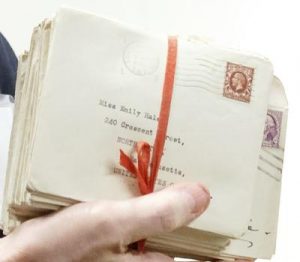 The letters from TS Eliot to Emily Hale are to be made freely available in full on tseliot.com, the website conceived by the TS Eliot Estate in partnership with Faber & Faber.
The letters from TS Eliot to Emily Hale are to be made freely available in full on tseliot.com, the website conceived by the TS Eliot Estate in partnership with Faber & Faber.
Currently being edited by John Haffenden, all of Eliot’s letters to Hale are now planned be posted online in Spring 2022, complete with footnotes as in a print edition.
It has emerged that publishing the letters in print would have required two volumes, each at an academic pricepoint, with potentially six months separating the volumes. Instead it has been decided to make all of the 1,131 letters available together, as they are at Princeton Library, affording a complete narrative, and accessible to anyone interested in Eliot.
(There will similarly be no “Selected” edition printed, as that would require some letters to be omitted.)
This digital publication will also make the Emily Hale letters distinct from the continuing annual series of printed volumes of The Letters of TS Eliot, also edited by John Haffenden.
———————————————————————————————————-
The “Mumbo-Jumbo” of The Waste Land: a notorious 1923 review, November 2020
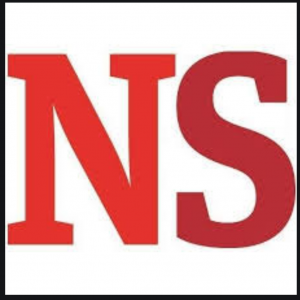 The New Statesman has reprinted from its archive its notoriously damning first review, by FL Lucas, of The Waste Land, first published in November 1923.
The New Statesman has reprinted from its archive its notoriously damning first review, by FL Lucas, of The Waste Land, first published in November 1923.
“It is not easy to dismiss in three lines what is being written about as a new masterpiece,” wrote Lucas, a classical scholar and literary critic. He therefore took a little longer.
“To attempt here an interpretation, even an intelligible summary of the poem, is to risk making oneself ridiculous,” he wrote.
He proceeded to criticise the poem’s “squalor” and “suburban sordidness”; and its “fantastic Mumbo-Jumbo”. He condemned its use of quotations – “the borrowed jewels he has set in its head do not make Mr Eliot’s toad the more prepossessing.” – and observed that “punctuation largely disappears in the latter part of the poem – whether this be subtlety or accident, it is impossible to say.”
“’Shantih’, he explained to his readers, “is equivalent to the ‘Peace that passeth understanding’ – which in this case it certainly does.”
Now an entertaining read, the review was later described by FW Bateson as “brilliantly wrong-headed”. It can be read in full here.
———————————————————————————————————-
TS Eliot’s Collected Poems as owned by playwright Christopher Fry, November 2020
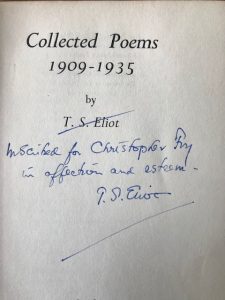 A First Edition of TS Eliot’s Collected Poems 1909-1935 has surfaced, bearing the ownership signature of playwright Christopher Fry, and “Inscribed for Christopher Fry in affection and esteem, TS Eliot”
A First Edition of TS Eliot’s Collected Poems 1909-1935 has surfaced, bearing the ownership signature of playwright Christopher Fry, and “Inscribed for Christopher Fry in affection and esteem, TS Eliot”
Fry and Eliot were the two leading proponents of Edwardian verse drama with spiritual themes. They were introduced by their mutual director, E Martin Browne.
In an unpublished reminiscence Fry remarked upon Eliot’s words, “which meant so much to me when I was young, and which stayed with me, unageing, while I grew old beside them.” As the bookseller writes in his description, “From the condition of the book it must be assumed that it was consulted by Fry on numerous occasions.”
The book is for sale through bookseller Peter Ellis.
Members can see further images of the book and Fry’s ownership signature in the Members Area, along with Fry’s unpublished reminiscence of how he and Eliot came to address each other.
———————————————————————————————————-
Biography and Writings of Vivien Eliot published, November 2020
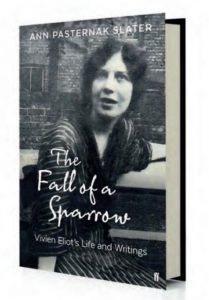 Faber & Faber have published The Fall of a Sparrow: Vivien Eliot’s Life and Writings.
Faber & Faber have published The Fall of a Sparrow: Vivien Eliot’s Life and Writings.
The Fall of a Sparrow is the first book to combine an impartial biographical account of Vivien Eliot’s life alongside her original writings, many previously unpublished.
The author, Ann Pasternak Slater is a literary scholar, translator and Senior Research Fellow at St Anne’s College, Oxford, who has written books on Shakespeare and Evelyn Waugh, and edited the complete poems of George Herbert.
Part I of the book, Life, is a 500-page detailed biography of Vivien Eliot, “making sense of an unruly mass of information and misinformation,” say Faber. “Here is the first cogent account of her physical and mental ailments.”
Part II, Writings, provides a further 240 pages of Vivien Eliot’s published and unpublished work, both independent and in collaboration with TS Eliot. His editing is identified, and the writings given scholarly annotation.
As an additional element of the project, a full transcript of her diaries, together with facsimiles and a selection from her ledgers, has been made available online, at www.tseliot.com/vivien
The Fall of a Sparrow: Vivien Eliot’s Life and Writings by Ann Pasternak Slater is published by Faber & Faber with a cover price of £35.
Reviews of The Fall of a Sparrow
The Sunday Times, Bryan Appleyard (£): “This book is a forensic and often ruthless — Eliot biographers are quoted mainly to be dismissed as rank fabulists — attempt to understand Vivien.”
TS Eliot Society Exchanges, Paul Keers: “Despite being the most substantial work yet published on Vivien Eliot, ironically a line of her husband’s might best describe the book: it is politic, cautious and meticulous.”
Sunday Telegraph, Tristram Fane Saunders (£): “Sympathetic but clear-eyed, The Fall of a Sparrow carefully sets the record straight on every juicy rumour…It’s a remarkable feat of scholarship, which succeeds in proving that Vivien was less interesting than you might have thought.
The Spectator, Robert Crawford: “At the level of individual sentences, footnotes and mini-essays, Pasternak Slater is intelligent and sophisticated; but she lacks the architectonic power a good biographer needs, and appears to have had trouble shaping her material. The Fall of a Sparrow often seems like a volume for scholars, rather than a biography aimed at a wide readership.” (UPDATE: Craig Raine has taken issue with this review via a letter in the subsequent issue of The Spectator – more details in the Members Area.)
Evening Standard, Ian Thomson: “In scrupulously researched and super-detailed pages it lays bare her every addiction and fit of madness. “
The Observer, Rachel Cooke: “For the reader, the result is a little like being in a courtroom during a case whose verdict will involve no real jeopardy. Where is the colour? The dash? Hundreds of pages in, I still couldn’t quite picture Viv and her world.”
The Literary Review, Elizabeth Lowry: “Hers is only the second biography of Vivien Eliot to date. She takes issue with the first, Painted Shadow by Carole Seymour-Jones (2001), precisely because it is ‘highly speculative, wilfully inaccurate, and loyally tendentious’ – in other words, more fiction than fact. The Fall of a Sparrow… sets out to be the opposite: short on invention, long on cross-references.”
The Guardian, Kathryn Hughes: “None of this is new and most of it will be familiar to the reader of the monumental The Letters of TS Eliot. What Pasternak Slater has done is, in her own words, “pick out a coherent narrative” from this sea of material, to which is added Vivien’s own writings“.
Church Times, Richard Harries: “Pasternak Slater has carried out the most meticulous research over many years to provide as fair-minded a picture of this tragedy as she can, based on primary sources. “
———————————————————————————————————-
Autumn issue of Exchanges…, our Society quarterly, November 2020

The Autumn issue of our Society quarterly is now available. Its editorial considers further the role of poetry during the pandemic; then the issue carries one of the first reviews of the new biography of Vivien Eliot, The Fall of A Sparrow. There are contributions on the activities of the Arvon Foundation, and on the teaching of Eliot at A-Level, with a final article by a recent A-Level student.
You can download this new issue here.
———————————————————————————————————-
TS Eliot’s book on Dante, belonging to “Mrs T.S. Eliot”, November 2020
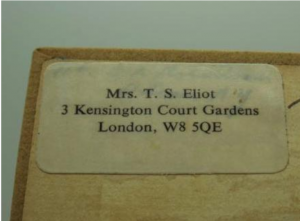 A First Edition copy of TS Eliot’s 1929 book on Dante has come on to the market, bearing a small sticker which declares its ownership by “Mrs T.S. Eliot”.
A First Edition copy of TS Eliot’s 1929 book on Dante has come on to the market, bearing a small sticker which declares its ownership by “Mrs T.S. Eliot”.
The address on the sticker is that of the Kensingon flat where Eliot lived with his second wife, Valerie.
Already relatively rare, this unique copy is now for sale at John Atkinson Fine & Rare Books.
———————————————————————————————————-
New audio recording of Four Quartets, November 2020
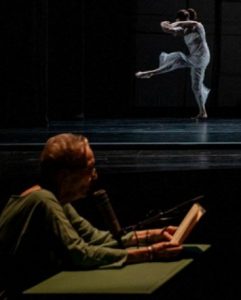 Following the streaming of their live interpretation of Four Quartets (see the Events page for details), the Fisher Center at Bard, New York, have released the reading of the work by Kathleen Chalfant which accompanied the performance.
Following the streaming of their live interpretation of Four Quartets (see the Events page for details), the Fisher Center at Bard, New York, have released the reading of the work by Kathleen Chalfant which accompanied the performance.
This is the first authorised recording of the work by a woman, and by an American.
Following the London performance in 2019, Chalfant was described by The Spectator as having “a voice like salted caramel: rich, molten and gravelled. She guides you to the wit, the pathos, bathos and silences.” Presented as an online “audiobook”, the reading can be heard here.
———————————————————————————————————-
The Complete Prose of TS Eliot to be published in print, October 2020
 The Complete Prose of TS Eliot, currently only available digitally to subscribers and libraries, is to be published as an 8-volume collection of books.
The Complete Prose of TS Eliot, currently only available digitally to subscribers and libraries, is to be published as an 8-volume collection of books.
Johns Hopkins University Press, which has been responsible for the digital version, is to publish the work in print, totalling over 7,000 pages and with 178 photographs, in March 2021. It has a list price of USD $700.
The collection comprises:
Volume 1: Apprentice Years, 1905–1918
Volume 2: The Perfect Critic, 1919–1926
Volume 3: Literature, Politics, Belief, 1927–1929
Volume 4: English Lion, 1930–1933
Volume 5: Tradition and Orthodoxy, 1934–1939
Volume 6: The War Years, 1940–1946
Volume 7: A European Society, 1947–1953
Volume 8: Still and Still Moving, 1954–1965
“It includes all of the essays that he collected in his lifetime,” say the publishers, “but also more than 1,000 uncollected, unrecorded, or unpublished items, many of which were missing or inaccessible for decades. From the formative “Interpretation of Primitive Ritual” (1913), written in graduate school at Harvard, to the summative “To Criticize the Critic” (1961), the Complete Prose offers readers full access to the immense scope and variety of Eliot’s works in their biographical, historical, and cultural context.”
However, JHU Press told us that “While the book is scheduled for a 23 March 2021 release here in the US, there are not currently plans for UK distribution, either through Hopkins Press or from a different publisher.”
Full details of the publication are here.
———————————————————————————————————-
Remediating ‘Prufrock’, October 2020
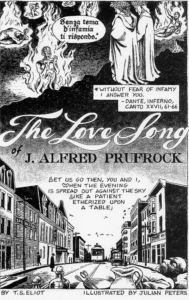 In an essay published in Arts, an MDPI open-access journal, Scott Freer looks at the ways in which The Love Song of J Alfred Prufrock has been “remediated” in various modern visual forms: the comic strip, the animated film, the dramatic monologue film, the split-screen video poem and the photographic spatial montage. The essay contains comments from interviews with several of the artists.
In an essay published in Arts, an MDPI open-access journal, Scott Freer looks at the ways in which The Love Song of J Alfred Prufrock has been “remediated” in various modern visual forms: the comic strip, the animated film, the dramatic monologue film, the split-screen video poem and the photographic spatial montage. The essay contains comments from interviews with several of the artists.
“Adaptation studies have shown that the transmedia phenomenon has not only refashioned, but also regenerated interest in, literary sources,” he writes. “Remediations can open up the ‘concentrated form’ of poetry and become an effective pedagogic tool, whilst the kineticism of visual media be harnessed to enhance the appeal of the static word.” In particular, he argues that remediation “offers multifarious possibilities for appreciating further the inherent visual properties of modernist poetry.”
Dr Scott Freer is Editor of the academic peer-reviewed Journal of the TS Eliot Society. The essay can be read here.
———————————————————————————————————-
The “looking-glass temporality” of TS Eliot’s letters to Emily Hale, October 2020
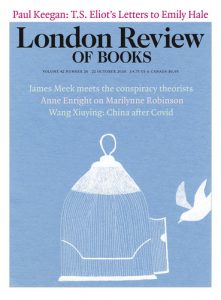 In a lengthy essay in the London Review of Books, Paul Keegan explores and has permission to quote extensively from TS Eliot’s letters to Emily Hale.
In a lengthy essay in the London Review of Books, Paul Keegan explores and has permission to quote extensively from TS Eliot’s letters to Emily Hale.
In Emily of Fire & Violence, Keegan writes that “One of the remarkable things about the Hale letters is the way they show [Eliot’s] more notorious opinions in more nuanced form, his thinking undressed.”
Across more than 15,000 words, Keegan considers Eliot’s comments across a range of subjects, including his family, his dramas, Boston society, divorce, Unitarianism, and the War. “In truth.” he says, “Hale was the listener, and the talking cure was Eliot’s own.”
Many quotes are enlightening, as when Eliot writes in October 1940 that, during his air-raid patrols, ‘one became acutely aware of the sense of hearing, and quite normal sounds aroused attention. I remember on one of my first nights being bothered by a strange sound, going out to reconnoitre, and discovering after several minutes that it was merely the dead leaves being swept along the street by the breeze.’ This clearly anticipates the leaves in Little Gidding.
Keegan suggests that “The letters to Hale are less of a one-stop shop for a new view of Eliot than has been suggested. They contain many paradoxes but few secrets… Any page of his prose written for publication is more nakedly revealing or harrowing than the bulk of his personal correspondence.”
But he concludes that “Insofar as they document his ordinary life, what the Hale letters confirm is the extremity of the terms on which [Eliot] lived with himself.”
———————————————————————————————————-
Murder In The Cathedral reissued, October 2020
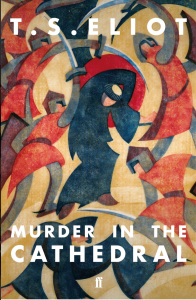 TS Eliot’s Murder In The Cathedral has been reissued in a paperback by Faber & Faber.
TS Eliot’s Murder In The Cathedral has been reissued in a paperback by Faber & Faber.
This anniversary edition marks 850 years since Becket’s dramatic murder, and eighty-five years since Eliot’s play was first performed, in Canterbury Cathedral.
The cover of this reissue features the 1931 work Monseigneur St. Thomas, a linocut by Cyril Power, the British artist who was one of the founders of the Grosvenor School.
Some vintage copies of the original hardback edition, in its classic dustjacket, are available to members on our Bookshelf page.
———————————————————————————————————-
Rare inscribed copy of TS Eliot’s Ash Wednesday, October 2020
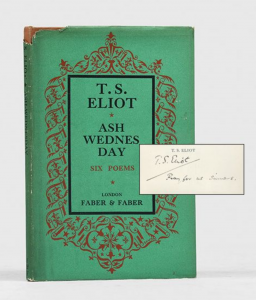 A unusually inscribed copy of Ash Wednesday has surfaced.
A unusually inscribed copy of Ash Wednesday has surfaced.
This First Edition has not only been signed by Eliot, but also inscribed by him with “Pray for us sinners”, quoting the end of the poem’s first section.
The book has the 1940 pencil ownership inscription of J. P. Pattinson, The Knoll, Windermere, most likely Dr. John Patrick Pattinson (1920-2005), who at this time was in his first year at Emmanuel College, Cambridge.
The book is currently with Peter Harrington Rare Books.
———————————————————————————————————-
Acclaimed multimedia interpretation of Four Quartets streaming online, October 2020
 The celebrated interpretation of Four Quartets by the US choreographer Pam Tanowitz is being streamed online, across the weekend of Friday, October 30 to Sunday, November 1.
The celebrated interpretation of Four Quartets by the US choreographer Pam Tanowitz is being streamed online, across the weekend of Friday, October 30 to Sunday, November 1.
For full details see the Events page.
———————————————————————————————————-
TS Eliot writes to Emily Hale about his visit to Little Gidding, October 2020
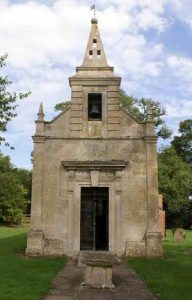 Letters to Emily Hale, written in May 1936, recount Eliot’s anticipation and experience of his only visit to Little Gidding.
Letters to Emily Hale, written in May 1936, recount Eliot’s anticipation and experience of his only visit to Little Gidding.
Frances Dickey, who is working her way through the letters, reports that in a letter of 21 May 1936, Eliot anticipates his visit, “where he plans to ‘shed a few tears over Crashaw, Mary Collett, Nicholas Ferrar and John Inglesant.'”
On the day after the visit, “he reports enthusiastically on his experience, recounting the history of the monastic settlement founded at the time of Charles I (he refers her to John Henry Shorthouse’s 1881 novel, John Inglesant). He describes the 17th century front of the church and its interior, of which he has taken photographs, and its atmosphere of holiness.”
The letters of this period also make reference to his visit to East Coker.
The letters to Emily Hale are currently being edited for publication; Dickey’s descriptions of their contents are being posted here.
———————————————————————————————————-
#MeToo, TS Eliot, and Modernist Scholarship, October 2020
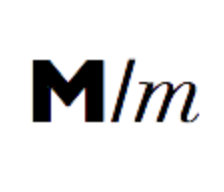 Published online by Modernism/modernity, the journal of the Modernist Studies Association, a cluster of nine essays aims to “build on, critique, and redirect our conversation about modernism and #MeToo, and about The Waste Land and its representations of women and racialized and sexualized violence.”
Published online by Modernism/modernity, the journal of the Modernist Studies Association, a cluster of nine essays aims to “build on, critique, and redirect our conversation about modernism and #MeToo, and about The Waste Land and its representations of women and racialized and sexualized violence.”
In her introductory essay, editor Megan Quigley, Associate Professor of English at Villanova University, Pennsylvania, asks “Should Eliot, who in 1957 married his secretary, 38 years his junior, now, in the era of #MeToo, be ‘cancelled’? Eliot’s posthumously published racist verses, particularly in the aptly titled The Columbiad, may be reason enough to topple his still-towering status. Among the many insights the antiracist movement has to offer, surely one of them is that the secure perch of a monumental figure like Eliot on our syllabi might be perpetuating white supremacy, an ideology we profess to abhor.”
She also pursues further the issues raised last year between herself and Christopher Ricks, over the annotations in The Poems of TS Eliot. She writes that Professor Ricks “participates in the very logic of patriarchy that our essays seek to examine. By thwarting new voices and new approaches, Ricks threatens to solidify Eliot’s place in the canon of dead white men”.
The essays can be read here.
———————————————————————————————————-
TS Eliot’s Prufrock has “a tremendously powerful effect” on actor Anthony Hopkins, September 2020
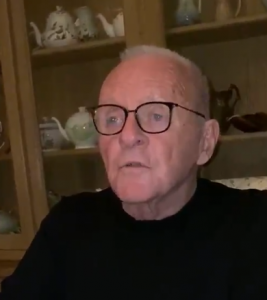 In an interview to promote his forthcoming film, The Father, the actor Anthony Hopkins told the US radio station SiriusXM that he is “haunted” by TS Eliot’s poem, The Love Song of J. Alfred Prufrock.
In an interview to promote his forthcoming film, The Father, the actor Anthony Hopkins told the US radio station SiriusXM that he is “haunted” by TS Eliot’s poem, The Love Song of J. Alfred Prufrock.
Sir Anthony explained: “He says at the end, ‘I grow old, I grow old. I shall wear the bottoms of my trousers rolled’.
“And that, when I see it… I get tearful.
“It’s not even the melancholy or the depression, it’s the fact that I’ve had an extraordinary life.
“Pulling all the strings and the fabrics of my life together now, the past is very present to me – my own parents, my father who worked hard all his life, my mother, my grandparents. So I’m putting all those threads into me and I can’t even describe it, but there’s a locality in my head that I’m back in Wales.
“It has a tremendously powerful effect on me because I realise that I’m up there now and I’m not scared and not afraid.”
The actor recently recited the poem in a lockdown video, posted online from his Los Angeles home, under the title: “Life…what’s it all about?”
———————————————————————————————————-
Now online: Jeremy Irons reads Four Quartets in New York, September 2020
 A video recording of Jeremy Irons reading Four Quartets live in New York has been made available online.
A video recording of Jeremy Irons reading Four Quartets live in New York has been made available online.
In April 2018, seventy-five years after the original publication of Four Quartets, Academy Award-winning actor Jeremy Irons presented the work in its entirety on the stage of 92Y in New York. Now, 92Y has released online, for a limited time only, their never-before-seen footage of the reading.
Details are here and online purchase is charged at US$10.
Now known simply as 92Y, the YMHA was founded in New York in 1874; it finally settled in a building on 92nd Street in 1930, and became known as the 92nd Street Y. “For 145 years,” they explain, “we have been serving our communities and the larger world by bringing people together and providing exceptional, groundbreaking programmes. But we are facing tremendous financial losses due to COVID-19.
“Your ticket purchase helps sustain our beloved institution, and supports the creation of new, online programming that will bring comfort and inspiration to our community.”
———————————————————————————————————-
TS Eliot amends the definition of “C.i.f. London”, September 2020
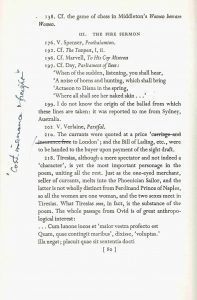 A copy of TS Eliot’s Collected Poems 1909-1935 has come on to the market, in which Eliot amends in his own hand the definition of “C.i.f. London” in his Notes on The Waste Land.
A copy of TS Eliot’s Collected Poems 1909-1935 has come on to the market, in which Eliot amends in his own hand the definition of “C.i.f. London” in his Notes on The Waste Land.
Earlier versions of the Notes stated that “c.i.f” meant that the currants (line 210) were “quoted at a price carriage and insurance free”. In 1959, Eliot’s secretary replied to a query that “Mr. Eliot says that he is quite likely to have been mistaken about the meaning of ‘c. i. f.’, but if so it was a piece of misinformation which he picked up while working in the Foreign Department of Lloyds Bank.”
In 1962, Eliot stated that he had “confirmed from Lloyds Bank that c.i.f. stands for cost, insurance and freight”, and that an alteration should be made in subsequent editions.
Consequently, this 1961 impression was the final printing to contain the incorrect information; Notes was amended in the subsequent Collected Poems 1909-1962. Eliot’s handwritten correction is very unusual; the volume is also signed by Eliot on the title page.
This is one of a number of interesting Eliot books being sold by the dealer Peter Grogan. Others include a First Edition of The Dry Salvages inscribed “for Stephen Spender with the affectionate regards of T.S. Eliot”; and a First Edition UK of Four Quartets inscribed pre-publication “to / The Master of Magdalene”, the poet Allen Ramsay. (Images of these can be seen in the Members Area.) A list of Peter Grogan’s books and letters by TS Eliot is here.
———————————————————————————————————-
TS Eliot, Good and Evil, September 2020
 A newly published essay by Jewel Spears Brooker explores Good and Evil in TS Eliot’s Letters to Emily Hale. Professor Brooker believes that “areas of overlap between Eliot’s letters to Hale and his contemporaneous class lectures are of the essence in following his thinking about the nature of evil.”
A newly published essay by Jewel Spears Brooker explores Good and Evil in TS Eliot’s Letters to Emily Hale. Professor Brooker believes that “areas of overlap between Eliot’s letters to Hale and his contemporaneous class lectures are of the essence in following his thinking about the nature of evil.”
Granted permission to quote directly from the Emily Hale letters, the essay in The Glass throws light upon the issues which Eliot had with the Unitarianism of both his own family and Hale herself. “Given the incongruity of their understanding of the spiritual life,” writes Brooker, “the slow demise of their romance seems to have been inevitable.”
The wide-ranging essay brings together Eliot’s view of (the capitalised) Good and Evil, as distinct from “good” and “bad”; his explorations of this in works by Joseph Conrad and Henry James; and his concern about the moral implications of his own influence, both on Hale, and on the wider Anglo-Catholic community. It also highlights an occasion when Eliot had “his own Conradian experience of ‘The Horror’.”
Jewel Spears Brooker, Professor Emerita at Eckerd College in Florida, has written or edited ten books, the latest of which is TS Eliot’s Dialectical Imagination.
———————————————————————————————————-
TS Eliot’s poetry by IA Richards republished from 1926, September 2020
“If it were desired to label in three words the most 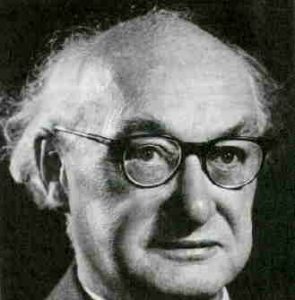 characteristic feature of Mr Eliot’s technique this might be done by calling his poetry a “music of ideas”.”
characteristic feature of Mr Eliot’s technique this might be done by calling his poetry a “music of ideas”.”
The New Statesman has republished from its archives a review of TS Eliot’s poetry by the critic IA Richards.
In a review of Eliot’s Collected Poems from February 1926, Richards makes the case for New Criticism, and argues against the contemporary criticisms of Eliot’s work, ultimately concluding: “Only those unfortunate persons who are incapable of reading poetry can resist Mr Eliot’s rhythms.”
———————————————————————————————————-
Charleston Festival to show TS Eliot Arena documentary online, September 2020
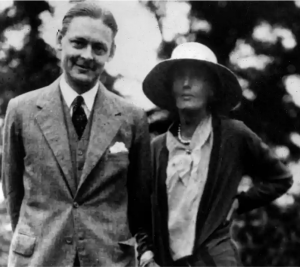 The BBC’s landmark 2009 documentary, Arena: T.S. Eliot, is to be shown online, as part of Charleston’s Small Wonder Festival At Home.
The BBC’s landmark 2009 documentary, Arena: T.S. Eliot, is to be shown online, as part of Charleston’s Small Wonder Festival At Home.
The documentary “takes an in-depth look at the Nobel Prize winner and seminal figure in twentieth-century English language literary culture who was a regular visitor to Charleston.” (Pictured here with Virginia Woolf.) With contributors including Seamus Heaney, Lady Spender, Jeanette Winterson and Christopher Ricks, the documentary features never-before-seen private scrapbooks, albums and archive footage from Valerie Eliot.
The film will be shown alongside exclusive new poems inspired by the documentary from poets including this years winner of the TS Eliot Prize for Poetry, Roger Robinson. Full details of the event are here.
The documentary will be available via the Festival website from 10am, Friday 25 September to 10pm, Sunday 27 September. It is free to view, although viewers may consider contributing to Charleston’s emergency appeal.
———————————————————————————————————-
Short online lectures from the International TS Eliot Summer School, August 2020
A series of fascinating short lectures,  available to all, are being posted online by the International TS Eliot Summer School.
available to all, are being posted online by the International TS Eliot Summer School.
The Summer School had to be cancelled this year, but Director Anthony Cuda explains that “as a way to keep our community as strong as ever, our faculty and staff have been working to bring you exclusive new digital content and resources. We’re calling these the 2020 T. S. Eliot Summer School Digital Sessions.”
The first postings, under a welcome from Cuda, include a report by Frances Dickey from the Emily Hale letters; Sarah Kennedy on the Landscapes poem Rannoch, by Glencoe; Jayme Stayer on the Pound-Monroe Quarrel over Prufrock; and Anthony Cuda himself on belatedness. Each is less than ten minutes long.
———————————————————————————————————-
Virginia Woolf and Old Possum, August 2020
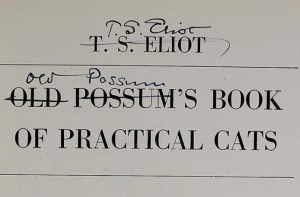 It has emerged that Virginia Woolf wanted to claim the credit for coining TS Eliot’s nickname, Old Possum.
It has emerged that Virginia Woolf wanted to claim the credit for coining TS Eliot’s nickname, Old Possum.
Anthony Cuda, US academic and Director of the International TS Eliot Summer School, has reported on some of the lighter moments contained within the letters from TS Eliot to Emily Hale, for Time Present, the newsletter of the US-based International TS Eliot Society. And in 1939, Eliot forwarded to Hale a short note he had received from Virginia Woolf, following the publication of Old Possum’s Book of Practical Cats.
Writing to Eliot on October 7th, after receiving her copy of the book, Woolf asks: “Can I claim the immortality of having christened you Old Possum? Oh dear, don’t do me out of that little clutch upon the skirts of posterity. Yes, I’m sure it was me.”
As early as 1923, Eliot and Ezra Pound were addressing each other as Possum and Rabbit, using nicknames from the Uncle Remus stories, and it has always been understood that Pound had coined Eliot’s nickname himself.
Woolf signs off her letter, “your old Mangy farmyard Tabby, Virginia.”
———————————————————————————————————-
Summer issue of Exchanges…, our Society quarterly, August 2020

The Summer issue of our Society quarterly is now available. In its editorial, the new issue rebuts an accusation that Eliot is ‘elitist’. There are contributions on the TS Eliot Poetry Prize, on a lesser-known parody of Eliot, and on poetry which has been helpful during the pandemic – plus a couple of shorter items.
You can download this new issue here
———————————————————————————————————-
TS Eliot’s photographs of Little Gidding, August 2020
 The mystery of TS Eliot’s 1936 photographs of Little Gidding has been solved.
The mystery of TS Eliot’s 1936 photographs of Little Gidding has been solved.
In her latest report from the Emily Hale letters at Princeton, Frances Dickey detailed a letter from Eliot to Hale of 16 January 1936. She reported that enclosed with the letter were photographs of the church at Little Gidding and Nicholas Ferrar’s tomb. This would predate by 5 months Eliot’s previously only known visit to Little Gidding on 25 May 1936.
“Mystery solved,” Dickey now reports. “The photographs were enclosed in Eliot’s June 18, 1936 letter, which mentions the visit to Little Gidding and George Herbert’s church. But in the digital scans, these photos seem to have been placed with his letters of early January. Thanks for pointing out this inconsistency!”
———————————————————————————————————-
2020 Journal of the TS Eliot Society (UK) published, July 2020
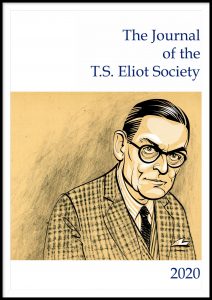 The 2020 edition of the academic peer-reviewed Journal of the TS Eliot Society has just been published.
The 2020 edition of the academic peer-reviewed Journal of the TS Eliot Society has just been published.
Edited by Dr Scott Freer, the 2020 edition contains essays that present either an aesthetic, a biographical or post-secular view of TS Eliot:
- Editorial, by our Editor, Dr Scott Freer
- Baudelaire and Moréas’s Symbolisme in TS Eliot’s The Waste Land, by Robert Gillespie of Blackhall, OBE
- Reconsidering Emily Hale, by Sara Fitzgerald, author of The Poet’s Girl: A Novel of Emily Hale and T.S. Eliot,
- ‘Where shall the word be found’: TS. Eliot Nearing the Post-Secular, by Charika Swanepoel,
- Book Review: Jeremy Diaper, T.S. Eliot and Organicism, by Scott Freer
For full details of how both members and public can obtain copies, please visit our dedicated Journal page from the menu above.
———————————————————————————————————-
TS Eliot rarities on sale, July 2020
Two books inscribed to TS Eliot’s niece, Theodora Eliot 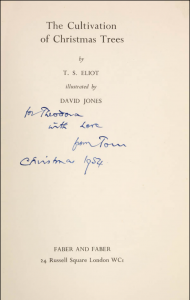 Smith, are on sale from Shapero Rare Books in London.
Smith, are on sale from Shapero Rare Books in London.
One (left) is a copy of the Ariel Poem, The Cultivation of Christmas Trees, signed “with love from Tom, Christmas, 1954.” The other, a copy of The Rock, is inscribed to her more formally “with love from TS Eliot.”
Among other Eliot rarities, 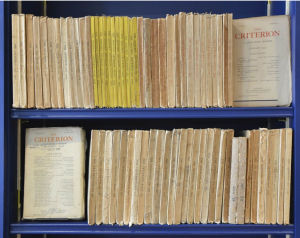 which include a copy of Ara Vos Prec, Shapero also have an almost complete set of the Criterion (right) in its various formats from 1923 to 1939. Only two issues are missing from the set, but sadly one of those is the first, which published The Waste Land for the first time.
which include a copy of Ara Vos Prec, Shapero also have an almost complete set of the Criterion (right) in its various formats from 1923 to 1939. Only two issues are missing from the set, but sadly one of those is the first, which published The Waste Land for the first time.
———————————————————————————————————-
Restoration work at Little Gidding, July 2020
 Significant restoration has been taking place at the church in Little Gidding.
Significant restoration has been taking place at the church in Little Gidding.
In early July, when the church would normally have played host to our Annual TS Eliot Festival, it was photographed swathed in scaffolding and polythene.
The Friends of Little Gidding explained that “Little Gidding Church received a substantial legacy from a gentleman called Ian Bentley, who had been a member of both the Friends and the TS Eliot Society. As a result, a number of restoration projects could be brought forward.
“This includes a major repair of the roof. The aim is to make it sound and waterproof for the next 100 years.
“Further restoration work is also planned or completed: the eagle lectern has been cleaned; the font is being cleaned and a new display case provided for it.”
A before-and-after image reveals the work that has already been done to its entrance (click to enlarge):
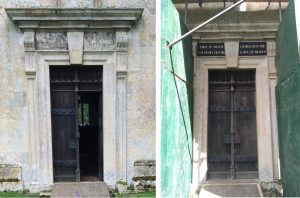 “The next phase will be to restore the bell, which is currently at a foundry. The refurbished gold inscription above the door shimmers beautifully, waiting for the bell’s return.”
“The next phase will be to restore the bell, which is currently at a foundry. The refurbished gold inscription above the door shimmers beautifully, waiting for the bell’s return.”
———————————————————————————————————-
Listen free to the latest recording of Old Possum’s Book of Practical Cats, July 2020
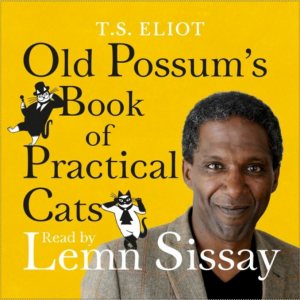 For one week only, the popular reading of Old Possum’s Book of Practical Cats by poet, playwright and broadcaster Lemn Sissay MBE can be heard free of charge online.
For one week only, the popular reading of Old Possum’s Book of Practical Cats by poet, playwright and broadcaster Lemn Sissay MBE can be heard free of charge online.
Lemn said the opportunity to record TS Eliot’s poems was “the best job ever”.
Until Sunday 19th July his recording, which was released only last year, can be heard free on Soundcloud here.
———————————————————————————————————-
David Hockney quotes TS Eliot to explain his self-confidence, July 2020
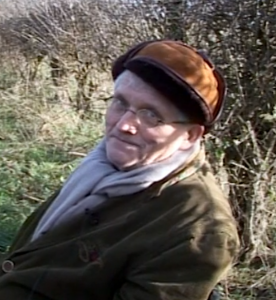 To celebrate the birthday of the artist David Hockney on 9th July, The Art Newspaper carries an outtake from the video Hockney Unlocked, in which Hockney is asked about his self-confidence in the face of his origins in provincial Bradford.
To celebrate the birthday of the artist David Hockney on 9th July, The Art Newspaper carries an outtake from the video Hockney Unlocked, in which Hockney is asked about his self-confidence in the face of his origins in provincial Bradford.
“Assurance,” he corrects his questioner. “Assurance.”
Then, paraphrasing TS Eliot, he continues, “Assurance sat on him, like the silk hat of a Bradford millionaire. The Waste Land. Eliot.
“I think scholars used to have arguments – did he mean Bradford, Yorkshire or Bradford, Pennsylvania? I assume he meant Bradford, Yorkshire.
“A wool man.”
David Hockney is 83.
———————————————————————————————————-
A history of a Waste Land church, June 2020
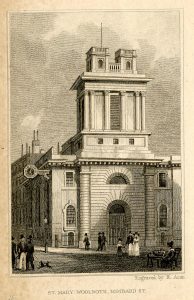 An article has been posted on A London Inheritance (“A Private History of a Public City”), which explores in some depth the history of St Mary Woolnoth, the church which famously chimes in The Waste Land “with a dead sound on the final stroke of nine.”
An article has been posted on A London Inheritance (“A Private History of a Public City”), which explores in some depth the history of St Mary Woolnoth, the church which famously chimes in The Waste Land “with a dead sound on the final stroke of nine.”
The article traces the church’s construction, and its design by Nicholas Hawksmoor; the stories behind its name; its problematic crypt; and its dealings with what became the London Underground. There are images, historic and contemporary, of both its exterior and interior – including the clock mechanism now on display, labelled with Eliot’s lines.
The article can be read here.
———————————————————————————————————-
New dates for TS Eliot books, June 2020
There are rescheduled publication dates for two forthcoming TS Eliot books.
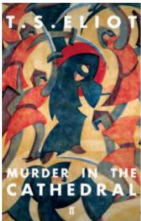 A reissue of Murder In The Cathedral, planned for publication in July, will now be published by Faber in October this year. Marking the 850th anniversary of the murder of Thomas Becket, the book’s cover features the linocut Monseigneur St Thomas by the English Modernist artist Cyril Power.
A reissue of Murder In The Cathedral, planned for publication in July, will now be published by Faber in October this year. Marking the 850th anniversary of the murder of Thomas Becket, the book’s cover features the linocut Monseigneur St Thomas by the English Modernist artist Cyril Power.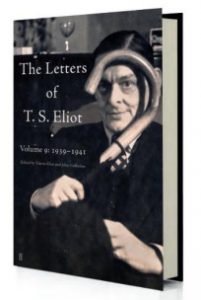
And Volume 9 of The Letters of TS Eliot is now scheduled for August 2021. Covering the years 1939-1941, the volume will cover the production of The Family Reunion, the publication of Old Possum’s Book of Practical Cats, and discussion of Four Quartets.
———————————————————————————————————-
TS Eliot’s Last Prose, June 2020
 In an critical essay in The Hudson Review, William H Pritchard explores Eliot’s Last Prose, effectively the last three volumes of the online Complete Prose, from 1940 to 1965.
In an critical essay in The Hudson Review, William H Pritchard explores Eliot’s Last Prose, effectively the last three volumes of the online Complete Prose, from 1940 to 1965.
“The great criticism Eliot wrote in the 1920s and 1930s (and the years leading up to 1920) is only minimally expanded by these final volumes,” he writes, “filled with often obligatory performances for this or that committee on one or another cultural or religious subject.” He quotes several other negative critics of Eliot’s later prose.
However, Pritchard finds and draws attention to “a number of places in which the critic succeeds in saying something very much worthwhile about poetry in practice.”
“As the immediacy of Eliot’s many formulations becomes less immediate,” he observes, “we read him not to be instructed or corrected, but in a more disinterested approach to him as ‘literature.’”
———————————————————————————————————-
International TS Eliot conference to be held online this year, May 2020
 The annual meeting of the International TS Eliot Society, based in the US, is to be held online this year, offering an opportunity for participation to those who might not have been able to travel to Massachusetts for the scheduled conference.
The annual meeting of the International TS Eliot Society, based in the US, is to be held online this year, offering an opportunity for participation to those who might not have been able to travel to Massachusetts for the scheduled conference.
Because of continuing concerns regarding the coronavirus, the program committee has decided to hold the 2020 annual meeting online, using the Zoom platform. Although the format of the conference will be modified, it will still comprise panels and seminars as well as their Memorial Lecture.
The organisers say that “We welcome clearly organized proposals of around 300 words, submitted as Word or PDF documents, on any topic reasonably related to Eliot, along with brief biographical sketches. The deadline for submission of abstracts has been extended to June 15th, 2020.”
Details of the conference and seminars, along with full details of the call for papers, are here.
———————————————————————————————————-
Book inscribed by TS Eliot to his sailing colleague, May 2020
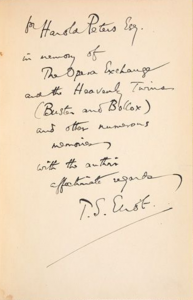 An inscribed copy of TS Eliot’s Poems 1909-1925, with an interesting association to Eliot’s years at Harvard and his links to the sea, has returned to market.
An inscribed copy of TS Eliot’s Poems 1909-1925, with an interesting association to Eliot’s years at Harvard and his links to the sea, has returned to market.
The book is inscribed to Harold Peters, a close undergraduate friend of Eliot. Peters sailed with Eliot on many holidays; “An experienced sailor,” according to Robert Crawford in Young Eliot, “Peters was naturally sporty in a way that Tom was not…Tom liked the camaraderie of such voyages.” Their friendship survived for some years, as this 1930 volume shows. “Although Vivienne found Peters’s attachment to Eliot rather comical,” writes Crawford, “Eliot told his mother that his former classmate was ‘the most lovable fellow in the world, and I think really devoted to me, and time cannot alter that.’”
The book, now in fine binding, is inscribed “To Harold Peters Esq. In memory of The Opera Exchange and the Heavenly Twins (Buster and Bollox) and other numerous memories with the author’s affectionate regards, T.S. Eliot”. The Opera Exchange was a Boston bar in which they would drink.
Formerly in the hands of David Brass Rare Books in the US, the book is now with London dealer Peter Harrington
———————————————————————————————————-
Why TS Eliot still matters, May 2020
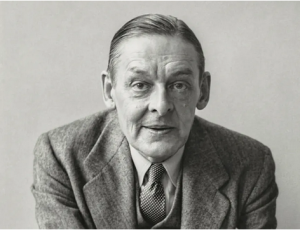 In an essay in Standpoint magazine, Douglas Murray explores why, as his contemporaries’ reputations have diminished, TS Eliot’s has grown.
In an essay in Standpoint magazine, Douglas Murray explores why, as his contemporaries’ reputations have diminished, TS Eliot’s has grown.
“He is the modern poet whose lines come to mind most often,” Murray believes. “The one we reach for when we wish to find sense in things. And certainly the first non-scriptural place we call when we consider the purpose or end of life.”
Murray argues that Eliot “didn’t just speak to his time, but found a way to reclaim time….while other artists showed how culture could be either shown off, strewn about or destroyed utterly, Eliot demonstrated how it could be reclaimed.””
And finally, Murray believes that Eliot undertook a journey, in which “[he] not only stared into the abyss or stood over it, but… managed to cross through it: through the howling fire that threatened to galvanise him, as it does everyone.”
Eliot, he concludes, “remains nearly unique among artists in the last century for having managed not just to walk through that century but, with occasional slips, extraordinary poise and a great deal of bravery, emerged at the other side of the fire-walk with a vision held aloft.”
———————————————————————————————————-
The sense of ‘home’ in TS Eliot’s poetry, May 2020
 “In a time of pandemic and social distancing, could there be a poet more useful to our understanding of the importance of home?” In a new essay, Rediscovering Home, the American writer and editor Scott Beauchamp argues that a “sense of nostalgia and homecoming…runs through Eliot’s work like a powerful electrical charge”.
“In a time of pandemic and social distancing, could there be a poet more useful to our understanding of the importance of home?” In a new essay, Rediscovering Home, the American writer and editor Scott Beauchamp argues that a “sense of nostalgia and homecoming…runs through Eliot’s work like a powerful electrical charge”.
With a particular focus on the influence of St Louis, and drawing upon Robert Crawford’s biographical work, Beauchamp explores “the sense of home which Eliot longed for in his earlier poems. Not simply the specific details of the St. Louis of his youth, or a depersonalized universal, but some sort of paradoxical resolution of the two into each other.”
———————————————————————————————————-
Spring issue of Exchanges, our Society quarterly, May 2020

The Spring issue of our Society quarterly is now available. Addressing a wide range of Eliot enthusiasms, this issue contains an academic essay on E McKnight Kauffer’s illustrations to Journey of The Magi; an article on errata and variations in editions of Eliot; and a personal piece about reading Little Gidding in the current crisis.
You can download this new issue here.
———————————————————————————————————-
TS Eliot inscription links book to wartime St Stephen’s, Gloucester Road, April 2020
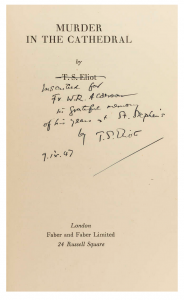 An interesting copy of Murder In The Cathedral, inscribed by TS Eliot, has sold at auction.
An interesting copy of Murder In The Cathedral, inscribed by TS Eliot, has sold at auction.
In Eliot’s hand, the book is “Inscribed for Fr. W.R. Alderson, in grateful memory of his years at St. Stephen’s by T.S. Eliot 9.ix.47”
Eliot had been Vicar’s Warden to Fr. Eric Cheetham at St Stephen’s, Gloucester Road, since 1934. He later wrote of the church during wartime that “at no time was St Stephen’s closed or the offices unsaid; [Fr. Cheetham] and Fr. Alderson, who was then his curate, said their daily masses through the worst of the bombardment.”
The book sold for just over £800 (including buyer’s premium).
———————————————————————————————————-
Letter reveals TS Eliot’s views on reading in childhood, April 2020
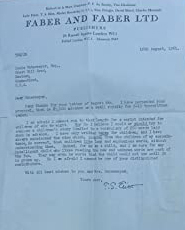 A letter has surfaced which casts a fascinating light on TS Eliot’s approach to writing for children, and on his own childhood reading.
A letter has surfaced which casts a fascinating light on TS Eliot’s approach to writing for children, and on his own childhood reading.
In 1961, Eliot was approached from the US to write “6-10 typewritten pages” aimed at children aged 6-8. It is likely that this was for a series of books, Modern Masters for Children, which succeeded in commissioning such illustrious contemporaries as Arthur Miller, Robert Graves and William Saroyan. A constraint was that the authors were limited to a vocabulary which educators believed would be appropriate for that age group.
Eliot’s letter replying to the commission in August 1961 has now surfaced. He “perpended” (pondered) the proposal, but “I am afraid that I cannot run to that length…I have only written verse for children.” [Eliot’s underlining]
More significantly, he continues: “Nor do I believe I could or should try to compose a children’s story limited to a vocabulary of 250 words laid down in advance.
“I have always maintained the view which, judging from the children of my acquaintance, is correct, that children like long and euphonious words, without understanding them. Indeed, for me as a child, and I am sure for any intelligent child who likes reading the new and unknown words are part of the fun. They may even be words that the child would not use until it is grown up.”
Eliot concludes, “So I am afraid I cannot be one of your distinguished contributors.”
The letter is currently in the hands of a US dealer in books and manuscripts.
———————————————————————————————————-
Remarkable collection of TS Eliot First Editions and publications goes on sale, April 2020
 An extraordinary collection of over 150 First Editions, periodical publications and other significant works by TS Eliot, has been put on sale. Assembled by a distinguished American librarian, “the collection represents a substantial and bibliographically significant selection of the poet’s publications.”
An extraordinary collection of over 150 First Editions, periodical publications and other significant works by TS Eliot, has been put on sale. Assembled by a distinguished American librarian, “the collection represents a substantial and bibliographically significant selection of the poet’s publications.”
The First Editions span Eliot’s oeuvre, from his second book, Ezra Pound: his metric and poetry (1917), through Ara Vos Prec (1920), rarities like After Strange Gods (1934) and 5 significant publications of Four Quartets. Many books are present in both English and US First Editions.
Unusually, the collection also includes the first publication of many of Eliot’s poems in periodicals; The Love Song of J. Alfred Prufrock in Poetry magazine; The Waste Land in The Dial; and East Coker, The Dry Salvages and Little Gidding in The New English Weekly. Also included are various translations, spoken word recordings, and an extensive number of periodicals containing contributions by Eliot.
A detailed list of this remarkable collection can be downloaded on PDF; it is on sale via the US dealers James S Jaffe Rare Books
———————————————————————————————————-
First publication of Prufrock now free access online, April 2020
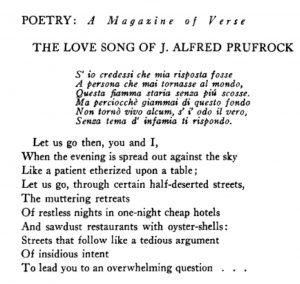 Pages from the June 1915 edition of Poetry magazine, in which The Love Song of J Alfred Prufrock appeared for the first time, have been made freely available online.
Pages from the June 1915 edition of Poetry magazine, in which The Love Song of J Alfred Prufrock appeared for the first time, have been made freely available online.
The academic publisher JSTOR has made the pages free to access and download here. It displays the original layout, indents etc of the poem’s first publication. JSTOR also provides access to the other contents of that issue.
The University of Chicago Special Collections have linked to their copy of the original transcript of the poem with editor’s marks and Eliot’s signature – free PDF copies of the full document can be requested.
———————————————————————————————————-
Willem Dafoe on playing TS Eliot, April 2020
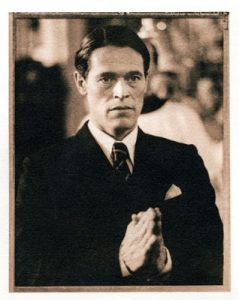 Willem Dafoe, the actor who played Eliot in the 1994 movie, Tom and Viv, has talked about playing the poet on screen.
Willem Dafoe, the actor who played Eliot in the 1994 movie, Tom and Viv, has talked about playing the poet on screen.
In an interview with Slash Film, Dafoe discusses his research in order to play real-life characters, and in particular TS Eliot. “The fact that I could read his letters, read his diary, read his critical words, read what he was working on at any given time, you could approximate what his state of mind was according to your imagination. And that kind of specificity is really fun to play with, because you’re not interpreting it, but you’re learning things that give you an appetite to think a different way. And I love when that happens.
“You’re not interpreting T.S. Eliot as you understand him. You’re inhabiting him. You’re imagining him. It’s not the T.S. Eliot. It’s your T.S. Eliot. And hopefully, it’ll be transparent enough that it’ll be resonant for people.”
Willem Dafoe has recently recorded a reading of The Waste Land (see below).
———————————————————————————————————-
The Essential TS Eliot, April 2020
 The US-based publshers Ecco Press have published a new selection of Eliot’s poetry as a hardback, e-book and audiobook, under the title The Essential TS Eliot.
The US-based publshers Ecco Press have published a new selection of Eliot’s poetry as a hardback, e-book and audiobook, under the title The Essential TS Eliot.
The audiobook is read by a number of American poets and literary figures, and is introduced by the Pulitzer Prize-winning poet, essayist and literary critic Vijay Seshadri. It includes Eliot’s own readings of La Figlia Che Piange and Preludes, and a reading of The Waste Land by actor Willem Dafoe, who played Eliot in the movie Tom & Viv (see above). Full details of the audiobook, which can be downloaded in the UK, and an excerpt from the Introduction, are here – click on ‘read more’ for the full contents.
———————————————————————————————————-
How the Emily Hale letters were sealed, April 2020
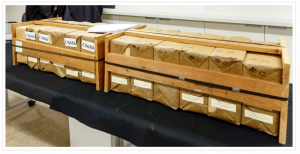 In an article on the website of the Princeton University Library, Daniel J. Linke, Interim Associate University Librarian for Special Collections, explores the manner in which the Emily Hale letters were physically sealed.
In an article on the website of the Princeton University Library, Daniel J. Linke, Interim Associate University Librarian for Special Collections, explores the manner in which the Emily Hale letters were physically sealed.
“Then, as now, Princeton University Library staff took their obligations to donors seriously,” he writes. In order to ensure the letters could not be read, he explains the use of a combination of paper, wood and metal bands – and how “the entire boxed, taped, and banded contraption protected the letters from the idly curious or prying eyes.”
———————————————————————————————————-
Pay TS Eliot, Esq. the sum of Fifteen Pounds exactly, April 2020
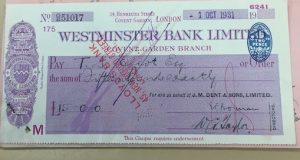 An unusual item of TS Eliot memorabilia is up for sale – a cheque, paying Eliot his fee for an essay, and countersigned by him.
An unusual item of TS Eliot memorabilia is up for sale – a cheque, paying Eliot his fee for an essay, and countersigned by him.
The cheque was issued by J.M. Dent in payment of Eliot’s fee of £15 for writing the introduction to the 1932 Everyman edition of Pascal’s Pensées.
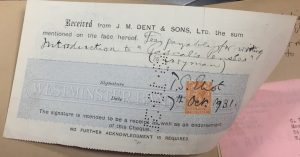 Eliot has signed the rear of the cheque, on 7th October 1931, to acknowledge receipt of the sum
Eliot has signed the rear of the cheque, on 7th October 1931, to acknowledge receipt of the sum
Accompanying the cheque is a small collection of correspondence between the publishers J.M.Dent and Faber, discussing the copyright in Eliot’s essay. Details and further pictures are at Neil Pearson Rare Books.
———————————————————————————————————-
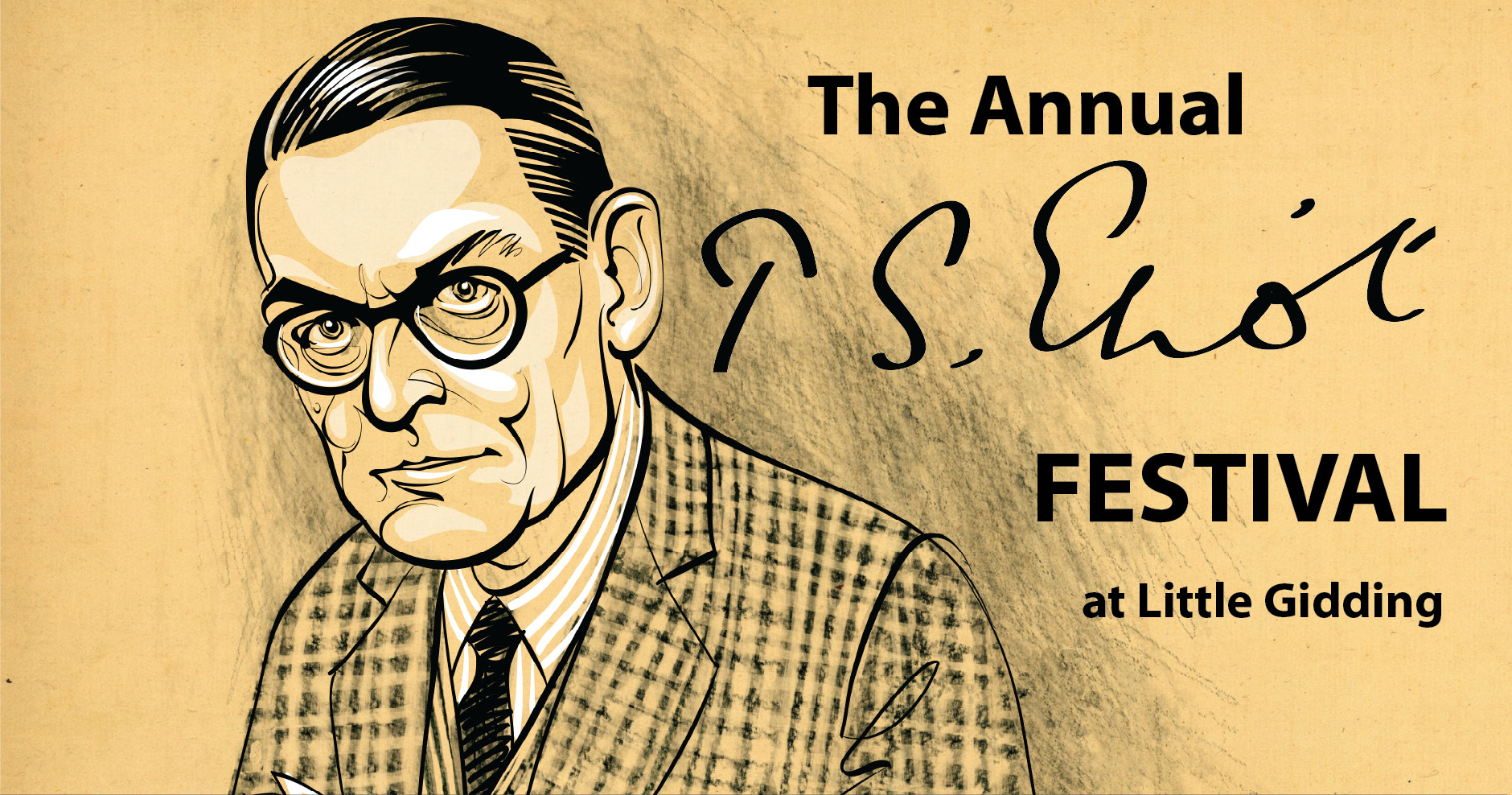 |
 |
2020 Annual TS Eliot Festival and International Summer School cancelled, April 2020
It has been announced with enormous regret that both the Annual TS Eliot Festival 2020, and the International TS Eliot Summer School 2020, have been cancelled due to the COVID-19 crisis.
The TS Eliot Festival was scheduled for 5th July at Little Gidding; the TS Eliot Summer School was to have run 4th to 12th July in London.
Announcing the cancellation of the Summer School, Georgia Reeves, their Events Administrator, said “The Institute of English Studies have made this difficult decision in response to official UK government restrictions on large gatherings of people and in response to projected models of the evolving global health crisis caused by COVID-19. And while July seems like a long way off, it is our responsibility to look ahead with an abundance of caution and to act in accordance with public health recommendations.” Further details are here.
The organisers of the Annual TS Eliot Festival have, regretfully, taken a similar decision to cancel their event, but hope to welcome its audience back to Little Gidding next year. Both events are hoping to roll over as much as possible of their planned line-ups to 2021.
———————————————————————————————————
Free access to the Complete Prose of TS Eliot during virus crisis, March 2020
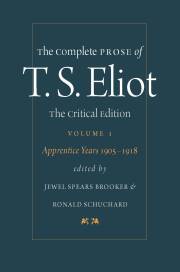 In response to the unprecedented challenges created by the COVID-19 global public health crisis, Johns Hopkins University Press is providing free access to its collection of books and journals currently on Project MUSE.
In response to the unprecedented challenges created by the COVID-19 global public health crisis, Johns Hopkins University Press is providing free access to its collection of books and journals currently on Project MUSE.
This includes the eight volumes of The Complete Prose of TS Eliot. This monumental work, containing Eliot’s prose writings including essays. lectures and academic letters, was previously only accessible through academic libraries or with subscription. All of its content is now freely accessible here.
In all, some 1,400 books and 97 journals will be accessible for free via MUSE for the remainder of the spring term.”MUSE is grateful for the opportunity to support our community through this crisis,” said Wendy Queen, the director of Project MUSE, “as a hub to connect users and the content they need, from wherever they can.”
———————————————————————————————————-
TS Eliot’s Little Gidding and the comfort of history, March 2020
 “The secluded chapel of Little Gidding…is a fitting place for a Christian poet to pray — and believe — that all manner of thing shall be well.”
“The secluded chapel of Little Gidding…is a fitting place for a Christian poet to pray — and believe — that all manner of thing shall be well.”
An essay, Plague and the comforts of history, by writer and historian Tom Holland, begins and ends with Eliot’s Little Gidding, “Written at a time when it seemed that Britain would lose the war, and civilisation itself be lost to ruin.”
Holland writes that “Churches, more than any other kind of building, bear the imprint of the past: of what Eliot would call the ‘pattern of timeless moments’.” He believes that churches retain the “trace elements” of previous crises in England, and through them he explores “the great chain of shared experience that, spanning millennia, joins the 21st century experience of epidemic to that of the distant Iron Age.”
“Perhaps,” he writes, “there is no meaning to be found in our vulnerability to infectious disease that is capable simultaneously of offering consolation. For all that, though, it may be there is an assurance to be discovered in the record of past generations.”
———————————————————————————————————-
TS Eliot as poet-critic, March 2020
 “The poet-critic has been an institution in English literature because usually only an artist has the stubborn animus, the conviction that art should be one way rather than another, that makes for interesting criticism.”
“The poet-critic has been an institution in English literature because usually only an artist has the stubborn animus, the conviction that art should be one way rather than another, that makes for interesting criticism.”
In TS Eliot’s animus, an essay in The New Criterion, the poet, critic, academic and editor Adam Kirsch explores the role of TS Eliot as a poet-critic. Eliot, he argues,“was the rare writer whose best essays were as significant and influential as his best poems.”
Kirsch writes that “Eliot the critic helped to create the taste by which Eliot the poet was enjoyed, even though—or, better, precisely because—his work in the two genres was so different in tone and approach.”
The essay examines the nature of Eliot’s “animus”, in the light of “the question that [Eliot] imagined a reader would ask: why should someone capable of writing great poems choose to spend his time writing critical prose?”
———————————————————————————————————-
International TS Eliot Summer School releases 2020 lecture schedule, February 2020
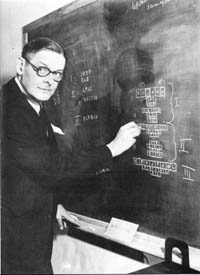 The full lecture schedule has now been released for the International TS Eliot Summer School, taking place in London from July 4th to 12th 2020.
The full lecture schedule has now been released for the International TS Eliot Summer School, taking place in London from July 4th to 12th 2020.
Lecturers include Sarah Kennedy, Seamus Perry, Megan Quigley, Frances Dickey and the Summer School’s Director, Anthony Cuda. The schedule also includes the poet Matthew Hollis; Ann Pasternak Slater, author of the forthcoming book on Vivien Eliot (see below); and an opening address by author Ian McEwan.
The schedule also includes both Lyndall Gordon and Mark Ford at the Annual TS Eliot Festival at Little Gidding on July 5th, the full programme of which is still to be released.
For the lecture schedule, click here, and for other details of the Summer School, click here.
———————————————————————————————————-
Vivien Eliot’s original writings to be published in new biography, February 2020
 A forthcoming biography of Vivien Eliot will be the first to combine an account of her life with her original writings.
A forthcoming biography of Vivien Eliot will be the first to combine an account of her life with her original writings.
The Fall of a Sparrow: Vivien Eliot’s Life and Writings by Ann Pasternak Slater is scheduled for publication by Faber & Faber in May this year. Ann Pasternak Slater is a literary scholar, translator and Senior Research Fellow at St Anne’s College, Oxford, who has written books on Shakespeare and Evelyn Waugh.
According to Faber, “Part One is a meticulous biography of Vivien, which also details the most eventful and formative years of TS Eliot’s life.
“Part Two is a scholarly collection of Vivien’s writings: they are evidence of talent, of collaboration, and reveal poignant, autobiographical trace-elements of a troubled, difficult life.”
UPDATE: Publication has been moved to 5th November
———————————————————————————————————-
Houghton Library Curator speaks of storing the statement by TS Eliot, January 2020
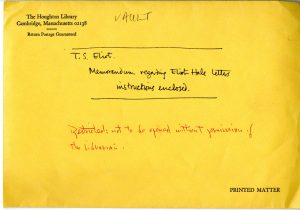 In an interview in the Harvard Magazine, Leslie Morris, the Curator of their Houghton Library, has spoken about keeping in storage the statement by TS Eliot concerning the Emily Hale letters.
In an interview in the Harvard Magazine, Leslie Morris, the Curator of their Houghton Library, has spoken about keeping in storage the statement by TS Eliot concerning the Emily Hale letters.
“I’d seen this thing sitting on a shelf in the vault for years,” says Morris, the Vidal curator of modern books and manuscripts at Houghton. “We knew it had to have something to do with the Hale letters, but we didn’t know what the document itself said.
“So, in contrast to the letters, there was this sense of, ‘Oh my God, we had no idea.’”
The article also contains photographs of the statement’s original packaging, and Eliot’s handwritten, signed covering note, describing it as a “Memorandum and covering letter concerning letters from me which may eventually be published.”
———————————————————————————————————-
Rare TS Eliot publication returns to market, January 2020
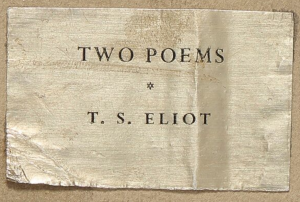 A copy of one of TS Eliot’s rarest publications is currently for sale from a New York dealer.
A copy of one of TS Eliot’s rarest publications is currently for sale from a New York dealer.
Just 22 copies of Two Poems were printed, for Eliot to give as Christmas presents in 1935. Stitched in stiff, laid paper wrappers, they were printed on a range of fine papers; this particular copy, J, is on Japanese rice paper. (The two poems are “Cape Ann” and “Usk”.)
Previously auctioned at Sotheby’s in 2017, the copy is now for sale by James Cummins Booksellers for $3750.
———————————————————————————————————-
TS Eliot’s critical opinions – criticised, January 2020
Writing upon the completion of The Complete Prose of TS Eliot, the 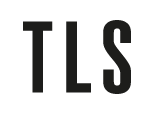 poet and critic Lachlan McKinnon has published a strongly critical essay in the TLS: Aesthetic certainty: A full exploration of Eliot’s critical opinions.
poet and critic Lachlan McKinnon has published a strongly critical essay in the TLS: Aesthetic certainty: A full exploration of Eliot’s critical opinions.
Unhappy with the format of the Prose, McKinnon says “these volumes are not a web resource. They are books placed online, lacking hypertext and separately indexed (unwieldy for rapid reference).” Using them is, he says, “substantially slower than with actual books”.
McKinnon then proceeds to criticise much of Eliot’s prose itself. He highlights the “overburdened” Eliot’s Shakespearean criticism; Eliot’s theory of “dissociation of sensibility” (which “led others on a wild goose chase”); his “unconvincing explanations” of his anti-semitic remarks; his “mind-boggling” insensitivity and “an appalling moral failure” in the face of post-WWII politics; and how Eliot’s “reversion to a narrow Anglicanism shows as a shabby, diminished thing.”
———————————————————————————————————-
Hannah Sullivan reads TS Eliot’s letters to Emily Hale, January 2020
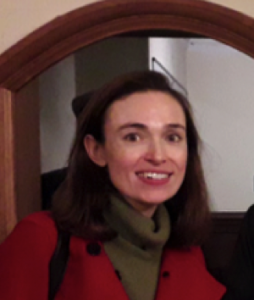 The TS Eliot Prize-winning poet and Eliot scholar Hannah Sullivan has been to Princeton, and writes in the TLS about reading some of Eliot’s letters to Emily Hale.
The TS Eliot Prize-winning poet and Eliot scholar Hannah Sullivan has been to Princeton, and writes in the TLS about reading some of Eliot’s letters to Emily Hale.
“It’s their vivacity,” she writes, “their urgency, agony, ecstasy, occasional petulance, jealousy, and above all their capacity for pain – that makes them worth reading.”
Unlike the scholars who are working chronologically through the letters, Sullivan jumps to the end, to letters dated 1947, and brings a particularly incisive eye to Eliot and Hale’s relationship and its significance for his poetry.
“What if a particular form of endlessly unfulfilled happiness, or endlessly exciting unhappiness, was exactly what the poems flourished on and needed?” she asks.
———————————————————————————————————-
Emily Hale’s narrative now available online, January 2020
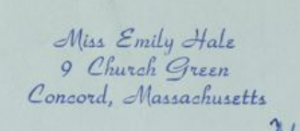 Princeton University Library has published online scans of the folder of letters, handwritten and typescript documents which Emily Hale submitted to accompany her letters from TS Eliot.
Princeton University Library has published online scans of the folder of letters, handwritten and typescript documents which Emily Hale submitted to accompany her letters from TS Eliot.
They allow a reader to trace the development of her “narrative” of their relationship, through her amendments and additions, such as the later inclusion of their trip to Burnt Norton, and her statement that Eliot regarded Burnt Norton as a love poem to her.
The formal description is that the folder “Includes several drafts of an account of the relationship between T.S. Eliot and Emily Hale, written by Emily Hale. Also included are letters from Hale to former University Librarian William S. Dix concerning corrections made to the drafts.”
The documents can be read here.
————————————————————————————————————————————————————————-
TS Eliot’s mandolin, January 2020
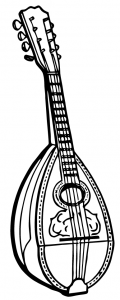 An article in the Times Literary Supplement tries to identify the type of mandolin(e) which TS Eliot owned, played, and referred to in The Waste Land. He reportedly played scales on a mandolin in Margate, while he was composing the poem.
An article in the Times Literary Supplement tries to identify the type of mandolin(e) which TS Eliot owned, played, and referred to in The Waste Land. He reportedly played scales on a mandolin in Margate, while he was composing the poem.
“To identify the kind of instrument that Eliot possessed would help determine the kind of music he played and the kind of sound he wanted to evoke,” writes NS Thompson. “Was it some kind of nascent jazz as in, say, the song ‘That Shakesperian Rag’ (composed in 1912) referenced in A Game of Chess, or something from vaudeville or even light classical?”
The article is here.
———————————————————————————————————-
Revealing interview with the authorised Editor of TS Eliot’s letters to Emily Hale, January 2020
 John Haffenden, Editor of the Letters of TS Eliot, has provided a fascinating and insightful overview of TS Eliot’s letters to Emily Hale, which he has begun editing for publication.
John Haffenden, Editor of the Letters of TS Eliot, has provided a fascinating and insightful overview of TS Eliot’s letters to Emily Hale, which he has begun editing for publication.
Professor Haffenden has given an audio interview to Spectator Radio: The Book Club: what do T.S. Eliot’s letters reveal? In it, he says that the letters present “A whole new dimension to the man which we never suspected before – he opens his heart in every way to her.”
“How wonderful to receive these letters,” he says. “I would fall in love with him instantly.”
The letters, he says, “personalise the man to an extraordinary new degree… he is quite upfront about his perceptions, his observations about people, about life. He’ll ruminate aloud about his task in life, his ambitions… it’s an expanse of feeling which he is now allowing room to breathe and come up and be spoken to this one individual.”
Professor Haffenden discusses the “evidence of his anger” in Eliot’s statement, which “being the sceptical generation” we must also feel was influenced by Valerie. He provides revelations, such as that Stravinsky’s Petrushka underlies The Hollow Men. He confirms that, while the letters will not be put online, they will be published by Faber in “mid-2021, which is not long to wait.” And he criticises those who, “rather scandalously in my view and unnecessarily”, are blogging and paraphrasing the content ahead of that publication.
———————————————————————————————————-
Updates from TS Eliot’s letters to Emily Hale, January 2020
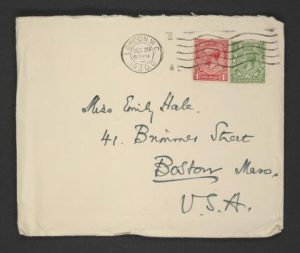 Frances Dickey, of the University of Missouri and the US-based International TS Eliot Society, is present and reading the letters in the Princeton Library Special Collections. For reasons of copyright, she is unable to quote directly from the letters, but is producing regular and revelatory summaries of their content.
Frances Dickey, of the University of Missouri and the US-based International TS Eliot Society, is present and reading the letters in the Princeton Library Special Collections. For reasons of copyright, she is unable to quote directly from the letters, but is producing regular and revelatory summaries of their content.
You are now able to subscribe to receive her summaries as a regular e-mail – you can register for that service here.
Her summaries to date have been published here. The most recent revelations include the identity of Marie in The Waste Land, and emotional declarations by Eliot in the Spring of 1931.
———————————————————————————————————-
TS Eliot’s Epiphany, January 2020
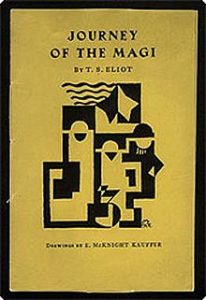 Two items are marking Epiphany, an occasion with great significance for TS Eliot.
Two items are marking Epiphany, an occasion with great significance for TS Eliot.
On BBC Radio 4’s Thought for the Day, Catherine Pepinster examines the concept of Epiphany through Eliot’s poem, Journey of the Magi, and how the poem “articulates something not just about the Magi, but about human experience.”
And tseliot.com is hosting a recording of Daniel Day-Lewis reading the poem, available until the Feast of Epiphany.
———————————————————————————————————-
Ash Wednesday – a love poem?, January 2020
In a revelation from the Emily Hale letters, it is suggested  that TS Eliot’s poem Ash Wednesday was inspired by his relationship with Emily Hale, and that only she will understand the poem.
that TS Eliot’s poem Ash Wednesday was inspired by his relationship with Emily Hale, and that only she will understand the poem.
“He makes a very clear declaration of his love for her,” says Frances Dickey, of the University of Missouri, who is reading the letters in the Princeton University Library, in an interview with NPR in the United States. “And even more significantly, he identifies poems that were inspired by her.
“He says that his love of her has helped me to the church and to the struggle of the spiritual life. And in the midst of agony, a deep peace and resignation springs. Not as the world giveth, but the peace of God. Of course there were many concurrent paths leading me to the altar, but I doubt whether I should have arrived but for you. And now there is no need to explain Ash Wednesday to you. No one else will ever understand it.”
(The First Edition of Ash Wednesday, published in 1930, carries the dedication: “To My Wife.”)
Frances Dickey is writing online as she continues to study the letters, with regular updates here.
———————————————————————————————————-
Posthumous statement by TS Eliot, January 2020
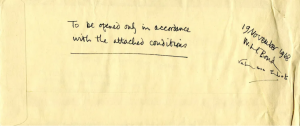 In an astonishing twist to the release of his letters to Emily Hale (below), a statement by TS Eliot has been released.
In an astonishing twist to the release of his letters to Emily Hale (below), a statement by TS Eliot has been released.
Written in 1960, then sealed and withheld by his executors until the opening of the letters, Eliot’s statement begins, “It is painful for me to have to write the following lines.” What follows is an autobiographical statement, not only about his relationship with Emily Hale, but also with his two wives, Vivienne and Valerie. And he describes his letters to Hale as “the letters of an hallucinated man”.
Of his relationship with Emily Hale he writes: “I came to see that my love for Emily was the love of a ghost for a ghost”
“It would have been a still greater mistake to have married Emily than it was to marry Vivienne Haigh-Wood.”
This extraordinary document – both its original typescript and a transcript – can be read on the website of the Houghton Library, Harvard, where the statement had been held.
Summaries of the statement have been published widely, including on the BBC and in The Telegraph – headlined TS Eliot’s letter from beyond grave: I did not have sexual relations with that woman.
In a Daily Mail article on the statement and letters, “TS Eliot expert Craig Raine said Eliot’s ‘devastating letter’ to the executors was a qualification of his love letters to Hale. ‘Take them with a sackful of salt, is what he is saying,’ he explains.”
Lyndall Gordon, who is reading the Emily Hale letters in Princeton Library, is quoted in a later article in The Telegraph: “Gordon said she was taken aback by the fervour of Eliot’s letters [to Emily Hale], and the cold dismissal of his feelings which he intended to preface the archive. ‘I can absolutely see why these letters were for her eyes alone,’ said Gordon. ‘Eliot made his feelings clear to Hale in these letters. It was not just a sentimental passing moment; he was more in love than ever.
“’What was striking to me, though, was the timed rebuttal. He found out in 1956 that the letters were to be handed to Princeton. And in 1960 he set off this bombshell, which went off exactly as planned. It’s astonishing to me how raw his anger was, even after all that time. It’s an absolute contrast to the letters themselves.'”
———————————————————————————————————-
TS Eliot’s letters to Emily Hale released, January 2020
 The letters from TS Eliot to Emily Hale, sealed since 1956, have been unsealed and released.
The letters from TS Eliot to Emily Hale, sealed since 1956, have been unsealed and released.
Frances Dickey, of the University of Missouri and the US-based International TS Eliot Society, is present and reading the letters in the Princeton Library Special Collections,. “There was always a possibility,” she writes “that the opening of the Hale letters would turn out to be a disappointment, merely adding to the volume of Eliot’s correspondence but not the depth of the correspondent.
“However, the first box dismisses any such worry. The collection begins with an extraordinary sequence of letters in which Eliot unrestrainedly confesses his feelings for Hale and credits her with both leading him to his religious faith and inspiring his poetry.”
Frances Dickey is writing online as she continues to study the letters, with regular updates here.
A summary with some quotes from the letters has been published in The Guardian.
———————————————————————————————————-
Lyndall Gordon on her career in Eliot studies, and the Emily Hale letters, January 2020
 In a wide-ranging interview by Cécile Varry in The Modernist Review, Lyndall Gordon talks about the significance of the Emily Hale letters; about meetings with Dame Helen Gardner and Eliot’s friend and colleague Peter du Sautoy, and about her life and career in Eliot studies.
In a wide-ranging interview by Cécile Varry in The Modernist Review, Lyndall Gordon talks about the significance of the Emily Hale letters; about meetings with Dame Helen Gardner and Eliot’s friend and colleague Peter du Sautoy, and about her life and career in Eliot studies.
Gordon was one of the first to take a biographical approach to Eliot’s work. “It’s hard to explain now how illegitimate it was at the time to link work and life,” she says. “I wasn’t just criticised —I was savaged!”
She says later in the interview, “You should be able to read the poems on their own to get the feeling of them, but if you know the facts of his life, it will deepen your understanding.”
———————————————————————————————————-
